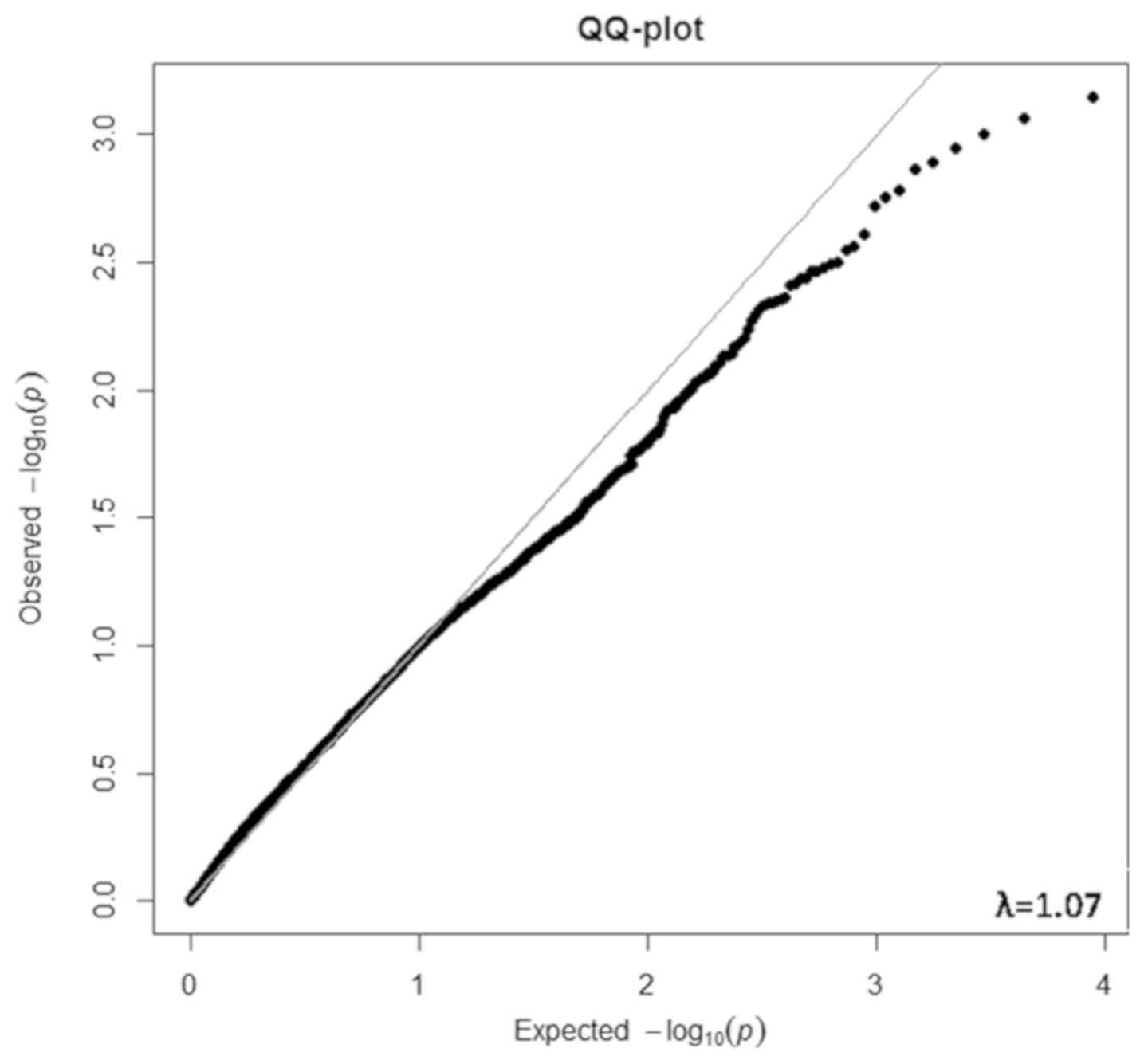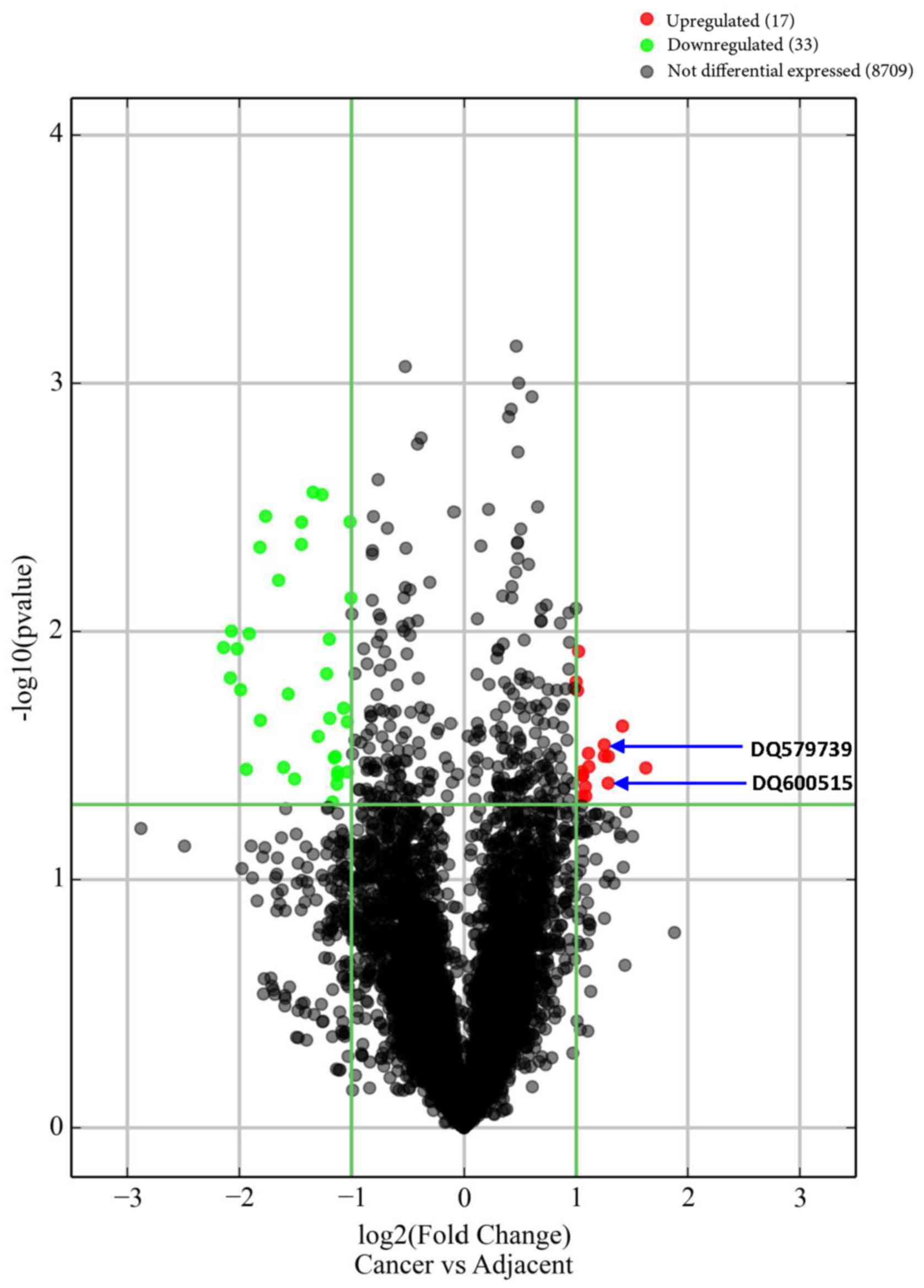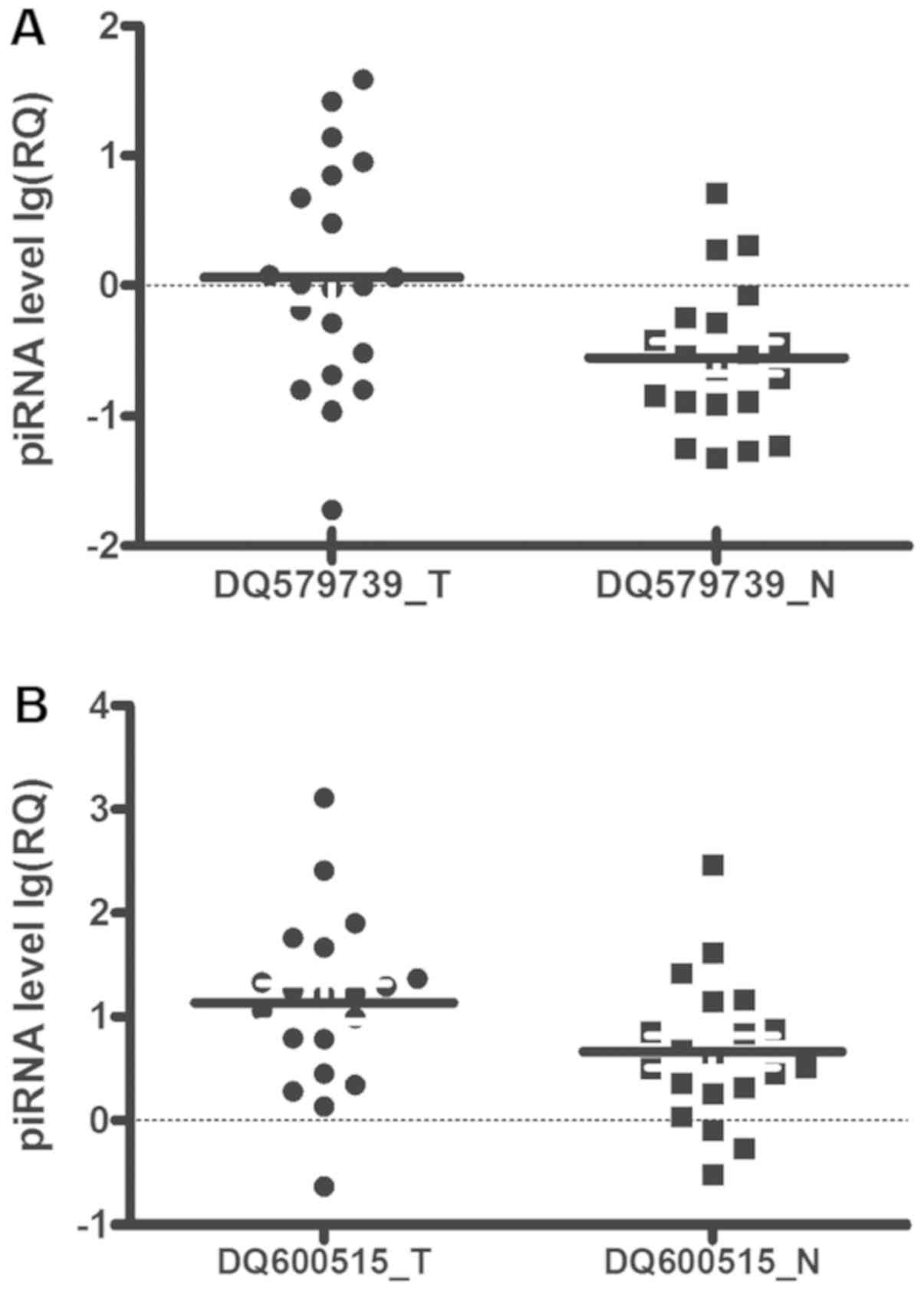|
1
|
Torre LA, Bray F, Siegel RL, Ferlay J,
Lortet-Tieulent J and Jemal A: Global cancer statistics, 2012. CA
Cancer J Clin. 65:87–108. 2015. View Article : Google Scholar : PubMed/NCBI
|
|
2
|
Lin X, Hu D, Chen G, Shi Y, Zhang H, Wang
X, Guo X, Lu L, Black D, Zheng XW and Luo X: Associations of THBS2
and THBS4 polymorphisms to gastric cancer in a Southeast Chinese
population. Cancer Genet. 209:215–222. 2016. View Article : Google Scholar : PubMed/NCBI
|
|
3
|
Berger H, Marques MS, Zietlow R, Meyer TF,
Machado JC and Figueiredo C: Gastric cancer pathogenesis.
Helicobacter. 21 (Suppl 1):S34–S38. 2016. View Article : Google Scholar
|
|
4
|
Kim J, Yum S, Kang C and Kang SJ:
Gene-gene interactions in gastrointestinal cancer susceptibility.
Oncotarget. 7:67612–67625. 2016.PubMed/NCBI
|
|
5
|
Lin XD, Chen SQ, Qi YL, Zhu JW, Tang Y and
Lin JY: Polymorphism of THBS1 rs1478604 A>G in 5-untranslated
region is associated with lymph node metastasis of gastric cancer
in a Southeast Chinese population. DNA Cell Biol. 31:511–519. 2012.
View Article : Google Scholar : PubMed/NCBI
|
|
6
|
Nakao T, Kurita N, Komatsu M, Yoshikawa K,
Iwata T, Utsunomiya T and Shimada M: Expression of thrombospondin-1
and Ski are prognostic factors in advanced gastric cancer. Int J
Clin Oncol. 16:145–152. 2011. View Article : Google Scholar : PubMed/NCBI
|
|
7
|
Takahata M, Inoue Y, Tsuda H, Imoto I,
Koinuma D, Hayashi M, Ichikura T, Yamori T, Nagasaki K, Yoshida M,
et al: SKI and MEL1 cooperate to inhibit transforming growth
factor-beta signal in gastric cancer cells. J Biol Chem.
284:3334–3344. 2009. View Article : Google Scholar : PubMed/NCBI
|
|
8
|
Hong CS, Jeong O, Piao Z, Guo C, Jung MR,
Choi C and Park YK: HOXB5 induces invasion and migration through
direct transcriptional up-regulation of β-catenin in human gastric
carcinoma. Biochem J. 472:393–403. 2015. View Article : Google Scholar : PubMed/NCBI
|
|
9
|
Xie SS, Jin J, Xu X, Zhuo W and Zhou TH:
Emerging roles of non-coding RNAs in gastric cancer: Pathogenesis
and clinical implications. World J Gastroenterol. 22:1213–1223.
2016. View Article : Google Scholar : PubMed/NCBI
|
|
10
|
Huang T, Ji Y, Hu D, Chen B, Zhang H, Li
C, Chen G, Luo X, Zheng XW and Lin X: SNHG8 is identified as a key
regulator of epstein-barr virus(EBV)-associated gastric cancer by
an integrative analysis of lncRNA and mRNA expression. Oncotarget.
7:80990–81002. 2016. View Article : Google Scholar : PubMed/NCBI
|
|
11
|
Fu A, Jacobs DI, Hoffman AE, Zheng T and
Zhu Y: PIWI-interacting RNA 021285 is involved in breast
tumorigenesis possibly by remodeling the cancer epigenome.
Carcinogenesis. 36:1094–1102. 2015. View Article : Google Scholar : PubMed/NCBI
|
|
12
|
Cheng J, Guo JM, Xiao BX, Miao Y, Jiang Z,
Zhou H and Li QN: piRNA, the new non-coding RNA, is aberrantly
expressed in human cancer cells. Clin Chim Acta. 412:1621–1625.
2011. View Article : Google Scholar : PubMed/NCBI
|
|
13
|
Zuo L, Wang Z, Tan Y, Chen X and Luo X:
piRNAs and their functions in the brain. Int J Hum Genet. 16:53–60.
2016. View Article : Google Scholar : PubMed/NCBI
|
|
14
|
Ross RJ, Weiner MM and Lin H: PIWI
proteins and PIWI-interacting RNAs in the soma. Nature.
505:353–359. 2014. View Article : Google Scholar : PubMed/NCBI
|
|
15
|
Aravin A, Gaidatzis D, Pfeffer S,
Lagos-Quintana M, Landgraf P, Iovino N, Morris P, Brownstein MJ,
Kuramochi-Miyagawa S, Nakano T, et al: A novel class of small RNAs
bind to MILI protein in mouse testes. Nature. 442:203–207. 2006.
View Article : Google Scholar : PubMed/NCBI
|
|
16
|
Sturm Á, Perczel A, Ivics Z and Vellai T:
The Piwi-piRNA pathway: Road to immortality. Aging Cell.
16:906–911. 2017. View Article : Google Scholar : PubMed/NCBI
|
|
17
|
Mei Y, Clark D and Mao L: Novel dimensions
of piRNAs in cancer. Cancer Lett. 336:46–52. 2013. View Article : Google Scholar : PubMed/NCBI
|
|
18
|
Ng KW, Anderson C, Marshall EA, Minatel
BC, Enfield KS, Saprunoff HL, Lam WL and Martinez VD:
Piwi-interacting RNAs in cancer: Emerging functions and clinical
utility. Mol Cancer. 15:52016. View Article : Google Scholar : PubMed/NCBI
|
|
19
|
Busch J, Ralla B, Jung M, Wotschofsky Z,
Trujillo-Arribas E, Schwabe P, Kilic E, Fendler A and Jung K:
Piwi-interacting RNAs as novel prognostic markers in clear cell
renal cell carcinomas. J Exp Clin Cancer Res. 34:612015. View Article : Google Scholar : PubMed/NCBI
|
|
20
|
Hashim A, Rizzo F, Marchese G, Ravo M,
Tarallo R, Nassa G, Giurato G, Santamaria G, Cordella A, Cantarella
C and Weisz A: RNA sequencing identifies specific PIWI-interacting
small non-coding RNA expression patterns in breast cancer.
Oncotarget. 5:9901–9910. 2014. View Article : Google Scholar : PubMed/NCBI
|
|
21
|
Yan H, Wu QL, Sun CY, Ai LS, Deng J, Zhang
L, Chen L, Chu ZB, Tang B, Wang K, et al: piRNA-823 contributes to
tumorigenesis by regulating de novo DNA methylation and
angiogenesis in multiple myeloma. Leukemia. 29:196–206. 2015.
View Article : Google Scholar : PubMed/NCBI
|
|
22
|
Law PT, Qin H, Ching AK, Lai KP, Co NN, He
M, Lung RW, Chan AW, Chan TF and Wong N: Deep sequencing of small
RNA transcriptome reveals novel non-coding RNAs in hepatocellular
carcinoma. J Hepatol. 58:1165–1173. 2013. View Article : Google Scholar : PubMed/NCBI
|
|
23
|
Huang G, Hu H, Xue X, Shen S, Gao E, Guo
G, Shen X and Zhang X: Altered expression of piRNAs and their
relation with clinicopathologic features of breast cancer. Clin
Transl Oncol. 15:563–568. 2013. View Article : Google Scholar : PubMed/NCBI
|
|
24
|
Zhang H, Ren Y, Xu H, Pang D, Duan C and
Liu C: The expression of stem cell protein Piwil2 and piR-932 in
breast cancer. Surg Oncol. 22:217–223. 2013. View Article : Google Scholar : PubMed/NCBI
|
|
25
|
Chu H, Hui G, Yuan L, Shi D, Wang Y, Du M,
Zhong D, Ma L, Tong N, Qin C, et al: Identification of novel piRNAs
in bladder cancer. Cancer Lett. 356:561–567. 2015. View Article : Google Scholar : PubMed/NCBI
|
|
26
|
Qiu W, Guo X, Lin X, Yang Q, Zhang W,
Zhang Y, Zuo L, Zhu Y, Li CR, Ma C and Luo X: Transcriptome-wide
piRNA profiling in human brains of Alzheimer's disease. Neurobiol
Aging. 57:170–177. 2017. View Article : Google Scholar : PubMed/NCBI
|
|
27
|
Martinez VD, Enfield KSS, Rowbotham DA and
Lam WL: An atlas of gastric PIWI-interacting RNA transcriptomes and
their utility for identifying signatures of gastric cancer
recurrence. Gastric Cancer. 19:660–665. 2016. View Article : Google Scholar : PubMed/NCBI
|
|
28
|
Levin HL and Moran JV: Dynamic
interactions between transposable elements and their hosts. Nat Rev
Genet. 12:615–627. 2011. View Article : Google Scholar : PubMed/NCBI
|
|
29
|
Malone CD and Hannon GJ: Small RNAs as
guardians of the genome. Cell. 136:656–668. 2009. View Article : Google Scholar : PubMed/NCBI
|
|
30
|
Reilly MT, Faulkner GJ, Dubnau J,
Ponomarev I and Gage FH: The role of transposable elements in
health and diseases of the central nervous system. J Neurosci.
33:17577–17586. 2013. View Article : Google Scholar : PubMed/NCBI
|
|
31
|
Roy J, Sarkar A, Parida S, Ghosh Z and
Mallick B: Small RNA sequencing revealed dysregulated piRNAs in
Alzheimer's disease and their probable role in pathogenesis. Mol
Biosyst. 13:565–576. 2017. View Article : Google Scholar : PubMed/NCBI
|
|
32
|
Hu N, Wang Z, Song X, Wei L, Kim BS,
Freedman ND, Baek J, Burdette L, Chang J, Chung C, et al:
Genome-wide association study of gastric adenocarcinoma in Asia: A
comparison of associations between cardia and non-cardia tumours.
Gut. 65:1611–1618. 2016. View Article : Google Scholar : PubMed/NCBI
|
|
33
|
Abnet CC, Freedman ND, Hu N, Wang Z, Yu K,
Shu XO, Yuan JM, Zheng W, Dawsey SM, Dong LM, et al: A shared
susceptibility locus in PLCE1 at 10q23 for gastric adenocarcinoma
and esophageal squamous cell carcinoma. Nat Genet. 42:764–767.
2010. View
Article : Google Scholar : PubMed/NCBI
|
|
34
|
Wang Z, Dai J, Hu N, Miao X, Abnet CC,
Yang M, Freedman ND, Chen J, Burdette L, Zhu X, et al:
Identification of new susceptibility loci for gastric non-cardia
adenocarcinoma: Pooled results from two Chinese genome-wide
association studies. Gut. 66:581–587. 2017. View Article : Google Scholar : PubMed/NCBI
|
|
35
|
Helgason H, Rafnar T, Olafsdottir HS,
Jonasson JG, Sigurdsson A, Stacey SN, Jonasdottir A, Tryggvadottir
L, Alexiusdottir K, Haraldsson A, et al: Loss-of-function variants
in ATM confer risk of gastric cancer. Nat Genet. 47:906–910. 2015.
View Article : Google Scholar : PubMed/NCBI
|
|
36
|
Shi Y, Hu Z, Wu C, Dai J, Li H, Dong J,
Wang M, Miao X, Zhou Y, Lu F, et al: A genome-wide association
study identifies new susceptibility loci for non-cardia gastric
cancer at 3q13.31 and 5p13.1. Nat Genet. 43:1215–1218. 2011.
View Article : Google Scholar : PubMed/NCBI
|
|
37
|
Chen YC, Fang WL, Wang RF, Liu CA, Yang
MH, Lo SS, Wu CW, Li AF, Shyr YM and Huang KH: Clinicopathological
variation of lauren classification in gastric cancer. Pathol Oncol
Res. 22:197–202. 2016. View Article : Google Scholar : PubMed/NCBI
|
|
38
|
Edge SB and Compton CC: The American joint
committee on cancer: The 7th edition of the AJCC cancer staging
manual and the future of TNM. Ann Surg Oncol. 17:1471–1474. 2010.
View Article : Google Scholar : PubMed/NCBI
|
|
39
|
Lau NC, Seto AG, Kim J, Kuramochi-Miyagawa
S, Nakano T, Bartel DP and Kingston RE: Characterization of the
piRNA complex from rat testes. Science. 313:363–367. 2006.
View Article : Google Scholar : PubMed/NCBI
|
|
40
|
He QQ, Xiong LL, Liu F, He X, Feng GY,
Shang FF, Xia QJ, Wang YC, Qiu DL, Luo CZ, et al: MicroRNA-127
targeting of mitoNEET inhibits neurite outgrowth, induces cell
apoptosis and contributes to physiological dysfunction after spinal
cord transection. Sci Rep. 6:352052016. View Article : Google Scholar : PubMed/NCBI
|
|
41
|
Yuan JS, Reed A, Chen F and Stewart CN Jr:
Statistical analysis of real-time PCR data. BMC Bioinformatics.
7:852006. View Article : Google Scholar : PubMed/NCBI
|
|
42
|
GTEx Consortium: The genotype-tissue
expression (GTEx) project. Nat Genet. 45:580–585. 2013. View Article : Google Scholar : PubMed/NCBI
|
|
43
|
Wu C, Orozco C, Boyer J, Leglise M,
Goodale J, Batalov S, Hodge CL, Haase J, Janes J, Huss JW III and
Su AI: BioGPS: An extensible and customizable portal for querying
and organizing gene annotation resources. Genome Biol. 10:R1302009.
View Article : Google Scholar : PubMed/NCBI
|
|
44
|
Wilhelm M, Schlegl J, Hahne H, Gholami AM,
Lieberenz M, Savitski MM, Ziegler E, Butzmann L, Gessulat S, Marx
H, et al: Mass-spectrometry-based draft of the human proteome.
Nature. 509:582–587. 2014. View Article : Google Scholar : PubMed/NCBI
|
|
45
|
Ohlsson L, Hammarström ML, Lindmark G,
Hammarström S and Sitohy B: Ectopic expression of the chemokine
CXCL17 in colon cancer cells. Br J Cancer. 114:697–703. 2016.
View Article : Google Scholar : PubMed/NCBI
|
|
46
|
Oosterhoff D, Overmeer RM, de Graaf M, van
der Meulen IH, Giaccone G, van Beusechem VW, Haisma HJ, Pinedo HM
and Gerritsen WR: Adenoviral vector-mediated expression of a gene
encoding secreted, EpCAM-targeted carboxylesterase-2 sensitises
colon cancer spheroids to CPT-11. Br J Cancer. 92:882–887. 2005.
View Article : Google Scholar : PubMed/NCBI
|
|
47
|
Xie X, Li F, Zhang H, Lu Y, Lian S, Lin H,
Gao Y and Jia L: EpCAM aptamer-functionalized mesoporous silica
nanoparticles for efficient colon cancer cell-targeted drug
delivery. Eur J Pharm Sci. 83:28–35. 2016. View Article : Google Scholar : PubMed/NCBI
|
|
48
|
Russo A, Maiolino S, Pagliara V, Ungaro F,
Tatangelo F, Leone A, Scalia G, Budillon A, Quaglia F and Russo G:
Enhancement of 5-FU sensitivity by the proapoptotic rpL3 gene in
p53 null colon cancer cells through combined polymer nanoparticles.
Oncotarget. 7:79670–79687. 2016. View Article : Google Scholar : PubMed/NCBI
|
|
49
|
Pagliara V, Saide A, Mitidieri E,
d'Emmanuele di Villa Bianca R, Sorrentino R, Russo G and Russo A:
5-FU targets rpL3 to induce mitochondrial apoptosis via
cystathionine-β-synthase in colon cancer cells lacking p53.
Oncotarget. 7:50333–50348. 2016. View Article : Google Scholar : PubMed/NCBI
|
|
50
|
Russo A, Pagliara V, Albano F, Esposito D,
Sagar V, Loreni F, Irace C, Santamaria R and Russo G: Regulatory
role of rpL3 in cell response to nucleolar stress induced by Act D
in tumor cells lacking functional p53. Cell Cycle. 15:41–51. 2016.
View Article : Google Scholar : PubMed/NCBI
|
|
51
|
Wang SY, Gao K, Deng DL, Cai JJ, Xiao ZY,
He LQ, Jiao HL, Ye YP, Yang RW, Li TT, et al: TLE4 promotes
colorectal cancer progression through activation of JNK/c-Jun
signaling pathway. Oncotarget. 7:2878–2888. 2016.PubMed/NCBI
|
|
52
|
Liu YL, Gao X, Jiang Y, Zhang G, Sun ZC,
Cui BB and Yang YM: Expression and clinicopathological significance
of EED, SUZ12 and EZH2 mRNA in colorectal cancer. J Cancer Res Clin
Oncol. 141:661–669. 2015. View Article : Google Scholar : PubMed/NCBI
|
|
53
|
Seo GS, Yu JI, Chae SC, Park WC, Shin SR,
Yoo ST, Choi SC and Lee SH: EED gene polymorphism in patients with
colorectal cancer. Int J Biol Markers. 28:274–279. 2013. View Article : Google Scholar : PubMed/NCBI
|
|
54
|
Song L, Chen X, Gao S, Zhang C, Qu C, Wang
P and Liu L: Ski modulate the characteristics of pancreatic cancer
stem cells via regulating sonic hedgehog signaling pathway. Tumour
Biol. Oct 12–2016.(Epub ahead of print). View Article : Google Scholar :
|
|
55
|
Jiang SH, He P, Ma MZ, Wang Y, Li RK, Fang
F, Fu Y, Tian GA, Qin WX and Zhang ZG: PNMA1 promotes cell growth
in human pancreatic ductal adenocarcinoma. Int J Clin Exp Pathol.
7:3827–3835. 2014.PubMed/NCBI
|
|
56
|
Hiraoka N, Yamazaki-Itoh R, Ino Y,
Mizuguchi Y, Yamada T, Hirohashi S and Kanai Y: CXCL17 and ICAM2
are associated with a potential anti-tumor immune response in early
intraepithelial stages of human pancreatic carcinogenesis.
Gastroenterology. 140:310–321. 2011. View Article : Google Scholar : PubMed/NCBI
|
|
57
|
Li L, Yan J, Xu J, Liu CQ, Zhen ZJ, Chen
HW, Ji Y, Wu ZP, Hu JY, Zheng L and Lau WY: CXCL17 expression
predicts poor prognosis and correlates with adverse immune
infiltration in hepatocellular carcinoma. PLoS One. 9:e1100642014.
View Article : Google Scholar : PubMed/NCBI
|
|
58
|
Chan AW, Tong JH, Chan SL, Lai PB and To
KF: Expression of stemness markers (CD133 and EpCAM) in
prognostication of hepatocellular carcinoma. Histopathology.
64:935–950. 2014. View Article : Google Scholar : PubMed/NCBI
|
|
59
|
Kang JS: Increased expression of
epithelial cell adhesion molecule (EpCAM) in rat hepatic tumors
induced by diethylnitrosamine. Asian Pac J Cancer Prev.
13:3627–3630. 2012. View Article : Google Scholar : PubMed/NCBI
|
|
60
|
Luo J, Cai Q, Wang W, Huang H, Zeng H, He
W, Deng W, Yu H, Chan E, Ng CF, et al: A microRNA-7 binding site
polymorphism in HOXB5 leads to differential gene expression in
bladder cancer. PLoS One. 7:e401272012. View Article : Google Scholar : PubMed/NCBI
|
|
61
|
Brennecke J, Aravin AA, Stark A, Dus M,
Kellis M, Sachidanandam R and Hannon GJ: Discrete small
RNA-generating loci as master regulators of transposon activity in
Drosophila. Cell. 128:1089–1103. 2007. View Article : Google Scholar : PubMed/NCBI
|
|
62
|
Burkhardt AM, Maravillas-Montero JL,
Carnevale CD, Vilches-Cisneros N, Flores JP, Hevezi PA and Zlotnik
A: CXCL17 is a major chemotactic factor for lung macrophages. J
Immunol. 193:1468–1474. 2014. View Article : Google Scholar : PubMed/NCBI
|
|
63
|
Matsui A, Yokoo H, Negishi Y,
Endo-Takahashi Y, Chun NA, Kadouchi I, Suzuki R, Maruyama K,
Aramaki Y, Semba K, et al: CXCL17 expression by tumor cells
recruits CD11b+Gr1 high F4/80- cells and promotes tumor
progression. PLoS One. 7:e440802012. View Article : Google Scholar : PubMed/NCBI
|
|
64
|
Weinstein EJ, Head R, Griggs DW, Sun D,
Evans RJ, Swearingen ML, Westlin MM and Mazzarella R: VCC-1, a
novel chemokine, promotes tumor growth. Biochem Biophys Res Commun.
350:74–81. 2006. View Article : Google Scholar : PubMed/NCBI
|
|
65
|
Mu X, Chen Y, Wang S, Huang X, Pan H and
Li M: Overexpression of VCC-1 gene in human hepatocellular
carcinoma cells promotes cell proliferation and invasion. Acta
Biochim Biophys Sin (Shanghai). 41:631–637. 2009. View Article : Google Scholar : PubMed/NCBI
|
|
66
|
Esposito T, Magliocca S, Formicola D and
Gianfrancesco F: piR_015520 belongs to Piwi-associated RNAs
regulates expression of the human melatonin receptor 1A gene. PLoS
One. 6:e227272011. View Article : Google Scholar : PubMed/NCBI
|

















